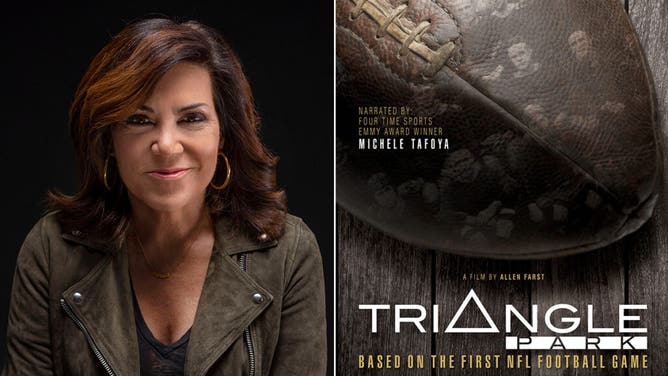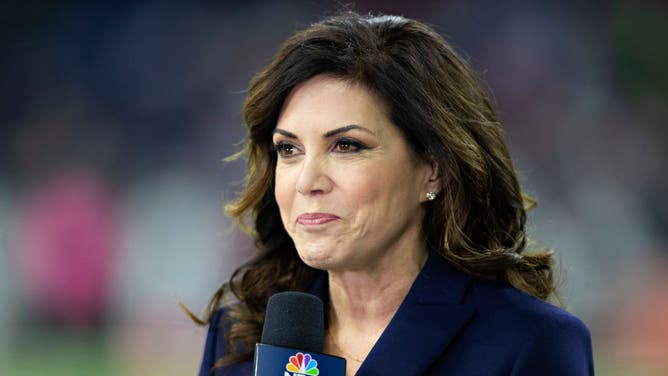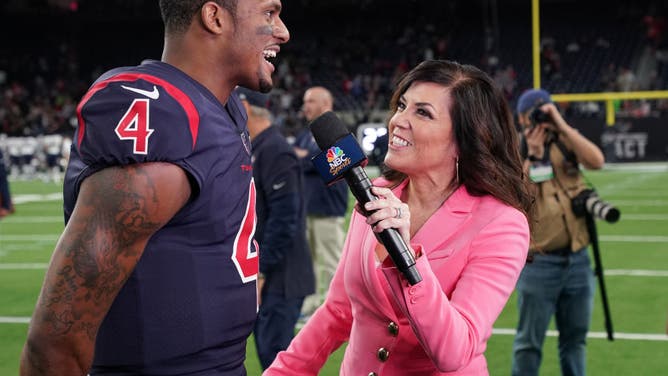New Movie Helps Tell The Tale Of Why No Game Is Better Than Football | Michele Tafoya
First and 10. That’s where it starts. In the game of football, the offense has four downs to advance the ball 10 yards toward the defense’s goal line. Complete that task and you get a fresh set of downs.
That is the first thing I remember my dad teaching me about football.
My Dad was a San Francisco 49ers fanatic. As a kid growing up in San Francisco, he would sneak into Kezar Stadium to watch the Niners play. After moving to Southern California to raise his family, he invested in 49ers season tickets and would drive 6 hours each way to Candlestick for home games. When he died, he was buried in a 49ers sweater vest with his 49ers putter next to him in the coffin.

Michele Tafoya narrates the movie 'Triangle Park,' which opens in theaters Nov. 22. (PalMar Studios)
I was raised to be a 49ers fan. As the youngest of four kids, I loved everything about football. I idolized Joe Montana, Roger Craig, Jerry Rice, Ronnie Lott, Bill Walsh, Dwight Clark, and Tom Rathman, among others.
And I was lucky enough to grow up during the Golden Age of television, when Sunday games featured the legendary calls of Pat Summerall and John Madden.
Learning The Basics Of Football
Between my dad and Madden, I learned the basics of football. And my passion for the game was born.
Madden used the Telestrator unlike any other analyst. With his application of highly technical terms like, “Boom,” and “Pow,” he had every football fan rapt.
(Sidebar: If you had told me I would eventually work with and become friends with Madden, I would have said you were crazy. But some dreams do come true.)
When football wasn’t in season, I followed the LA Lakers. The “Showtime” era will never be replicated. The first MLB game I ever attended featured Nolan Ryan pitching a no-hitter for the California Angels against the Minnesota Twins.

Michele Tafoya worked for NBC Sports from 2011-22. (Photo by Wesley Hitt/Getty Images)
And there was that college recruiting trip I took to visit Stanford and Cal on an autumn weekend in 1982. I found myself in the stands at Berkeley’s Memorial Stadium when John Elway and the Cardinal were defeated by the Joe Kapp-coached Golden Bears with an assist from the Stanford band. That trombone was epic!
(Another sidebar: I was offered a partial scholarship to go to Stanford, but after attending that Big Game, I chose Cal.)
As far as I was concerned, football was the greatest game on the planet. And once I decided to become a sports journalist, the NFL was the game I wanted to cover more than any other.
No Sport More Exciting Than The NFL
During the three decades of my sports broadcasting career I was given hundreds of assignments — five Olympic Games, five NCAA Men’s Final Fours, multiple NBA Finals, the College World Series, the WNBA, the U.S. Open tennis tournament, college football, the Women’s Final Four, and more.
But nothing excited me more than the NFL.
And somehow, the combination of hard work and timing ultimately landed me the most coveted assignments in sideline reporting: Monday Night Football, and Sunday Night Football.
From 2004 to 2021, I covered 327 primetime NFL games. I’m told no other NFL sideline reporter had ever done that before.
I never worked harder in my life. Hall of Fame producer Fred Gaudelli set the bar extremely high. Hall of Fame director Drew Esocoff called the shots. And colleagues Al Michaels, John Madden, and Cris Collinsworth inspired me to prepare for games like my life depended on it.
And the role I held made me love football even more. Even though its rule book rivals the tax code in volume and detail, football is essentially simple. The offense has to move the ball, the defense has to stop them. It’s 11 on 11.

Tafoya with then-Houston Texans quarterback Deshaun Watson in Dec. 2019. (Getty Images)
But within that simplicity there is three-dimensional chess. Moving the ball ain’t easy. You can run it or throw it depending on the dozens of looks the defense is giving you.
A team’s attack is also based on what its strengths are. Not every offense has a Patrick Mahomes or a CeeDee Lamb. And not every defense has a Danielle Hunter or a Darius Slay.
And if you don’t have a solid offensive line, well, good luck.
(Another sidebar: offensive linemen are the smartest, funniest guys on every team. Bank on it. Some of the best information — and many of the best one-liners — I got from each week’s preparation came from offensive linemen.)
Football is also unique because of its third phase, special teams. Overlook that facet of the game at your peril. One of the greatest sports moments I ever witnessed was Steve Gleason’s blocked punt early in the Saints 23-3 win over Atlanta on Monday Night Football. It was the game that re-opened the Superdome in 2006 after Hurricane Katrina. Iconic.
Pursuits Outside Of Sideline Reporting
So, why the hell would I leave the game I adored to pursue other avenues?
First, I had other things I wanted to try. Second, I wanted to leave on my own terms.
Not long after I left NBC, I was contacted by a documentary filmmaker, Allen Farst. He was producing a film about the first-ever NFL game, which was played in Dayton, Ohio. Farst had written and directed the award-winning film, “Chuck Leavell: The Treeman,” about the Rolling Stones keyboardist.
The film, “Triangle Park,” is named for the location of that first game.
I asked if I could narrate the film, and he said, “Yes.”
We collaborated to recruit all kinds of football star-power for the film: Cris Collinsworth. Joe Buck. Troy Aikman. Tony Dungy. Suzy Kolber. Larry Fitzgerald. Ben Roethlisberger. Eric Dickerson. Sean McVay. Cooper Kupp. Terry McAuley. Joe Theismann.
But the film is not about us. It’s about a single football game played in 1920 — the same year women in America secured the right to vote.
The film is about history. It’s about the birth of an institution.
There is only one first. And we all helped tell the tale… for the love of the game.
See Triangle Park on Wednesday, Nov. 22, at 7 PM, at AMC Theaters in NFL cities.